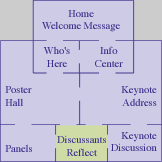 Susan Snyder Susan Snyder |
I have enjoyed reading the papers, posters, and panel discussions of this conference. Having been away from NSF for a year, I was particularly interested to learn about the results of projects that I either funded or had heard about while I was still with the Foundation. I was impressed by the way presenters laid out their cases so that the reader could learn from their experiences and try to gain insight into the reform process. The expertise and hard work of project personnel coupled with a conviction that reform is possible have clearly made a difference in thousands of classrooms across the country. Though the conference was on sustainability, I think that most of the presenters are currently more interested in "getting it right" than keeping it going. They have learned that the magnitude of reform that was asked of the LSC projects was very difficult to achieve and the timeframe for that change probably unrealistic.
|
From all I read there are several areas that seem to stand out in my mind:
- First, though there are many issues and obstacles to overcome, the general concept of basing professional development on the implementation of high quality materials that meet national standards is still valid. What is not as clear is whether whole district reform is the place to begin when addressing different levels of reform or different disciplines. It appears that the change at the elementary level is possible across whole districts but change at the secondary level is much more likely to be successful by targeting individual schools or teachers. This has major implications for the planning, implementation, and sustainability of efforts.
- It is also clear that though exemplary materials can provide additional support for teachers, they can become lightening rods for dissension, especially in mathematics. Such problems necessitate that project leaders, district leaders, and teachers be prepared for the political aspects of the reform and understand the management of change. Luckily, the conference included many examples of where this is happening.
- Successful reform efforts seem to need the school districts to be key partners, but sustainability may be easier when there is a major outside supporter for the effort. Superintendents change, school board members are elected or defeated, supervisors change and teachers leave, but some of the institutions created by these projects are continuing to fight for the vision.
- Teacher turnover is a more serious problem than anyone anticipated and must be considered up front when planning any such effort. In addition, lack of substitutes and changes in state or local policy make it increasingly difficult to reach teachers during the school day. New models, such as special summer school programs, seem to be very promising and, given their varied funding sources, also sustainable. I was surprised that though new teacher development was a recurring theme, there was little or no discussion of the need for addressing preservice education programs.
- Administrators and their role in curricular reform was a theme that kept recurring. It is clear that few projects involved principals early enough and to the degree needed. We heard about some successful examples but more problems. This is another area where turnover has been a major problem for projects. Most projects have had problems with new superintendents and few had suggestions for dealing with the issue.
- The keynote address and many projects stressed the need to prepare administrators, project staff, and teachers' leaders to understand the change process and how to effectively institute a reform. We need to have more models of ways to accomplish this for all levels of the system.
- The issue of evaluation was addressed often and the use of data, especially student outcomes, was a recurring theme. I was interested to read such thoughtful accounts of how teachers and administrators can gain better control over accountability and use assessment information to improve achievement. I was saddened to learn that information about student gains due to project activity can often be withheld from the public and ignored by administrators.
Finally, I would like to say that it has been fascinating to be able to attend a virtual conference. Though I miss the more personal interactions of colleagues, I have enjoyed being able to have the convenience of time and place that a virtual conference allows.
|


